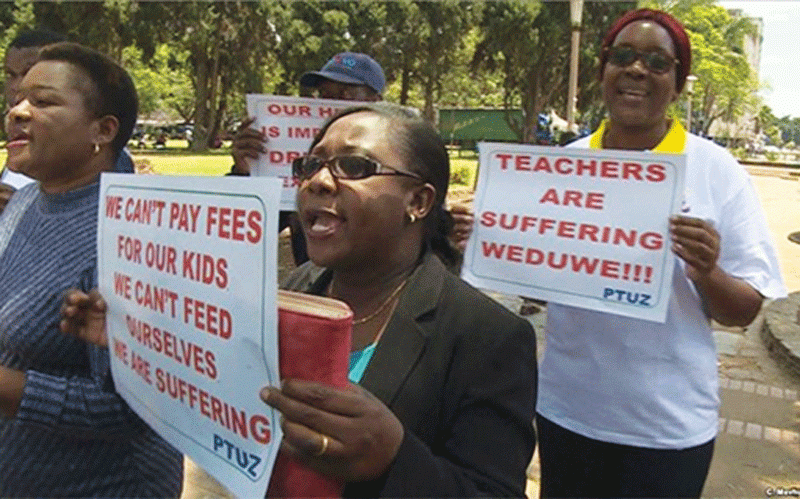
THE brouhaha between the Zimbabwean teachers and government over the issue of measly salaries teachers are receiving should be resolved as soon as is practicable.
There is a trite saying which states: “Where two elephants fight, the grass suffers.” The unspoken dimension of the saying can also be: “Where two elephants fight or make love, the grass still ‘suffers’.” My argument here is that symbolically the grass stands for learners.
When the teachers are happy (elephants making love), the learners will naturally benefit from their physical and intellectual energies that will be deployed in the teaching-learning process.
The elephants in the context of this polemic are the government and the teachers. The government is an elephant in that it has resources at its disposal that can be channeled towards improving the working conditions of teachers. Not offering teachers decent salaries can be explained in terms of the government’s priorities.
Teachers also constitute an elephant in that they come with soft-power that can either make or break the performance of learners. It is the object of this opinion piece to intimate to the reader that the teachers cannot afford to work like elephants and at the end of the day feed like rats.
The relationship between the teachers and government should be a relationship that is guided by interactive justice. Where interactive justice is concerned there is equal participation in decision-making, there is co-production and co-creation. Every party to the discussion table should be treated with civility and respect.
The current situation whereby the Government of Zimbabwe negotiates with teachers with an attitude of high-handedness is as wrong because it ultimately affects the learner who, in the context of the above analogies is the grass. Teachers’ salaries cannot afford them decent meals, neither are they enough to send their children to boarding schools and they cannot safely cater for their rentals and bus fares. One cannot talk about the so-called “take home” on the teachers’ salary, because it is not even enough to take them home.
When teachers are short-changed by the system, they also develop a survivalist spirit by moonlighting; their moonlighting in most cases will not stray beyond their areas of specialisation. Rather, they will collude with their Heads of schools for space and time that they can use for extra tuition with the same students they are supposed to teach according to prescribed hours. This collusion with Heads of schools has seen students having “informal lessons,” say after dismissal time or having children coming over to school during the weekends or having backyard school facilities in areas in which they are domiciled.
- Teachers, other civil servants face off
- Veld fire management strategies for 2022
- Magistrate in court for abuse of power
- Vungu Dam water treatment and irrigation project takes off
Keep Reading
These informal lessons do not come without costs to the parents. Parents are handsomely charged to enable the teachers to teach their children. The money that is received by teachers is also shared with the Heads of their schools.
Parents are paying to have their children receive extra tuition because they realise that a goose cannot lay golden eggs if it has not been given quality food. Parents who want quality education for their children are going an extra mile by even providing of their own volition appreciation gifts to teachers.
The Government of Zimbabwe has set the Zimbabwe Anti-Corruption Commission (Zacc) on schools that are involved in these informal teaching-learning processes, but for this writer doing so is not seeing the bigger picture because the meagre salaries for teachers have created this fertile ground for survival. Zacc will not quash the practice under discussion, only decent salaries for teachers will bring back normalcy into the education sector.
The sad thing about our education system now is that children coming from indigent families will not receive quality education because quality education has become a function of the jungle. In a jungle, only species that are strong will survive. Within the formal four walls of the classroom attention is being given to children of parents who have freebies for the teachers and outside of the formal four walls of the classroom (maricho literally moonlighting), full attention is being given to children whose parents can afford to pay an extra dollar for the teacher.
Equity and equality in the classroom have become as scarce as the teeth of a hen, because the system for the remuneration of teachers has become unattractive and to that effect a fork in the road for teachers has created opportunities for moonlighting (maeke) which only benefits children from rich families.
The Government of Zimbabwe should be concerned about teachers’ salaries and engage in good faith with teachers without creating unnecessary spaces for populism. Populism will not serve the education system because the education system cries out for economic justice. Charging teachers for extra lessons or maeke will not stop maeke because there is always the underground space that can be exploited by teachers to earn that extra dollar for survival.
The solution is for the Government of Zimbabwe to give teachers decent salaries, and the government can do that because it has mineral wealth that can be specifically fenced off for the education sector.
Nicholas Aribino is ZimCare Trust country director and is writing in his own capacity










